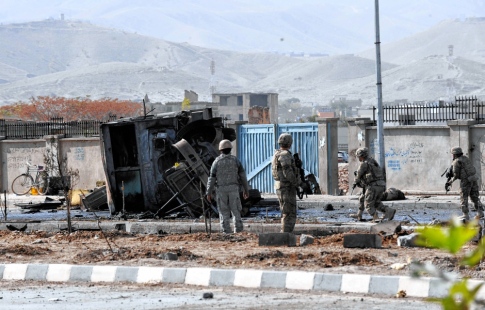
At least 12 Americans were killed when a Taliban suicide bomber rammed a
NATO convoy in Afghanistan Saturday, destroying a heavily-armored bus.
The bombing - the deadliest attack in the war-torn country in months -
sent flames and dark smoke shooting into the Kabul sky and turned the
NATO vehicle into a crumpled, burning wreck.
U.S. officials confirmed that four American soldiers and eight contractors were killed in the explosion.
A Canadian solider and four Aghans were also killed, according to officials. Several more soldiers were wounded.
The Taliban claimed responsibility for the attack, which occurred when a
NATO convoy passed the American University in a southwestern
neighborhood of the capital city.
The reinforced bus, known as a Rhino, was driving amid a series of
mine-resistant vehicles on a highway frequently used by NATA forces,
officials said.
A Taliban spokesman said the bomber - who he identified as Abdul Rahman - was driving a Toyota Land Cruiser SUV containing more than 1,500 pounds of explosives.
Though it was not immediately clear how the SUV penetrated the convoy's
security, it slammed into the side of the Rhino - and the collision
sparked a massive fireball that could be seen for more than a mile.
The bus was knocked on its side, crushing several civilians, and
shrapnel exploded into the street, wounding a dozen more, officials
said.
NATO and Afghan forces quickly locked down the area as fire trucks and
ambulances raced to the scene. Two NATO helicopters were also used to
evacuate casualties to nearby hospitals.
Witnesses said several body bags could be seen strewn across the four-lane highway.
The Taliban spokesman claimed that 25 people died in the explosion -
but NATO officials were skeptical of the boast. The Pentagon did not
immediately identify the soldiers who were killed.
The brazen daylight assault was the largest in Kabul since the war
began in 2001. The capital is largely protected by the Afghanistan
military.
The bombing occurred as top NATO and Afghan officials met elsewhere in
Kabul to discuss the ongoing shift of security responsibilities to
Afghanistan's military.
The attack also was viewed as a setback to Afghan President Hamid Karzai's efforts to negotiate peace with the Taliban in advance of NATO's scheduled departure from the country in 2014.
"The enemies of Afghanistan carried out a dastardly and cowardly attack
that caused sorrow for some Afghan families," Karzai said in a
statement.
It was the deadliest strike against American forces since Aug 6, when
the Taliban shot down a NATO helicopter, killing 30 U.S. soldiers,
including members of the elite Navy Seal Team 6, the squad that carried
out the famed raid on Osama bin Laden's compound.
The suicide bombing mirrored an attack on the same highway in May 2010
when a SUV loaded with explosives slammed into a NATO caravan, killing
five Americans and one Canadian officer.
Other acts of violence also rocked Afghanistan yesterday. A man wearing
a Afghan military uniformed started shooting at a joint NATO-Afghan
base in the Uruzgan province, killing three people. It was not clear if
the shooter was a soldier or someone who stole a military uniform,
officials said.
And another suicide bomber detonated herself outside a government
office in the northwest province of Kunar. It was not immediately clear
how many people were injured in that attack.
Officials did not speculate if the attacks were linked. More than 1,700
American soldiers have died in Afghanistan since the war began.
